|
Sharing Laity Lodge. Laity Lodge Memories. Laity Lodge Review. Laity Lodge Echoes.

by Rev. Dr. Mark D. Roberts
Copyright © 2007 by Mark D. Roberts
Note: You may download this resource at no cost, for personal use or for use in a Christian ministry, as long as you are not publishing it for sale. All I ask is that you give credit where credit is due. For all other uses, please contact me at mark@markdroberts.com. Thank you.
Sharing Laity Lodge: An Introduction
Part 1 of series: Sharing Laity Lodge
Permalink for this post / Permalink for this series
If you've been reading my blog recently, you know that I've taken a new position as the Senior Director and Scholar-in-Residence for Laity Lodge, a multifaceted ministry in the Hill Country of Texas. One of my responsibilities in this position is to organize and facilitate retreats at Laity Lodge. During the school year I'll be out in "the Canyon" where Laity Lodge is located once a month or so. In the summer, I'll be out there for almost all of our retreats. When I am not overseeing a retreat, most of the time my fellow Director, Steven Purcell, will be in charge. He will take the lion's share of the retreats during the school year as I focus on the broader responsibilities associated with my job.
In the last few weeks I've participated in two retreats at Laity Lodge: a men's retreat for men from Covenant Presbyterian Church in Austin and a leadership retreat. During both of these retreats, I found myself wishing I could share with others what I was experiencing through the teaching, the music, and so forth. To be sure, part of what makes a retreat at Laity Lodge special cannot be experienced apart from being there. It's impossible to convey adequately the sense of peacefulness, freedom, reverence, joy, and friendship that one experiences at a retreat in the Canyon. Nevertheless, some of what Laity Lodge offers can be shared through the Internet, and that's what I'll try to do in this series.
 I expect I'll offer different kinds of material in this blog series. Sometimes I'll put up highlights from the speakers. At other times you'll get, not descriptions of what I heard so much as my own responses. I may also comment on the musicians and artists, or on anything else that seems worth sharing with my blog readers. I expect I'll offer different kinds of material in this blog series. Sometimes I'll put up highlights from the speakers. At other times you'll get, not descriptions of what I heard so much as my own responses. I may also comment on the musicians and artists, or on anything else that seems worth sharing with my blog readers.
Now you may wonder if I have a hidden agenda here: Am I really trying to get you to come to a retreat at Laity Lodge? Let me be clear from the outset: Sure! I'd love to have some of my readers participate in Laity Lodge retreats. I think what we do out there is fantastic, and I'd love to get more of my friends involved. In fact, several of the folk I have met at Laity Lodge in the last month have turned out to be among my "blog audience." That's been fun for me. But even if you never actually visit Laity Lodge, I hope this series will allow you to enjoy some of God's gifts that are given so lavishly there. (You can find out much more about Laity Lodge at our website.)
I expect that I'll contribute to this series occasionally. It will be of the "on-again, off-again" type. Chances are you'll get more in the summer and less during the school year. But, who knows? One of the things I enjoy about blogging is the opportunity to start out on a literary journey without knowing exactly where it is going.
A Word from Lloyd Ogilvie
Last weekend's leadership retreat featured Dr. Lloyd Ogilvie, former Chaplain of the U.S. Senate, and my pastor and mentor for the last 35 years. In my next post I'll say a bit more about what Lloyd shared in his four messages. Today I want only to highlight one his sentences, one that I've probably heard at least a hundred times, one that has had a huge influence on my life. Here's the sentence:
"To be in Christ is to be in the ministry."
The phrase "in Christ" is common in the letters of St. Paul. It describes the status, almost the location, of all believers in Jesus. If you are a Christian, then you are "in Christ."
And also "in the ministry." Now I realize that it's common to speak of "the ministry" as that into which clergy are ordained. Only pastors, preachers, and priests are "in the ministry," according to common speech. But Lloyd Ogilvie faithfully summarizes the biblical vision of God's people, in which all Christians are called into and empowered for the ministry of Christ.
If you read my last series, Why Move?, you know that I first learned this fundamental biblical truth from none other than Lloyd Ogilvie, when I was fourteen years old. It has had a profound impact on my life since then, and is one of the main reasons I have joined the team of Laity Lodge. What Lloyd put into one succinct sentence lies at the heart and soul of Laity Lodge's vision.
Oh, if only the people of God really believed that "to be in Christ is to be in the ministry"! How liberating this would be! How challenging! How transformational of individual lives, families, churches, businesses, and universities . . . even of governments and whole societies! Lloyd Ogilvie had more to say about the implications of this basic truth. I'll summarize a bit further in my next post.
Lloyd Ogilvie at Laity Lodge
Part 2 of series: Sharing Laity Lodge
Permalink for this post / Permalink for this series
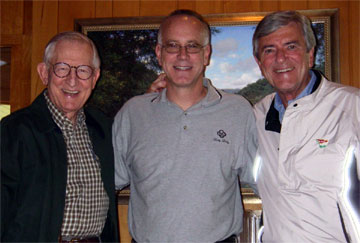 As I mentioned in my last post, the Rev. Dr. Lloyd Ogilvie was the main speaker at a recent Laity Lodge retreat intended especially for leaders. If you're not familiar with Lloyd Ogilvie, let me say that he was most recently the Chaplain of the U.S. Senate. Before this, he was the Senior Pastor of the First Presbyterian Church of Hollywood for twenty-three years. During this time he was my pastor, then my boss and my mentor. Lloyd Ogilvie has published more than fifty books and has preached in hundreds of churches and other venues. He continues to be one of the most influential Christian leaders in our country. Perhaps more importantly, he's a man of deep faith, contagious love, and impeccable integrity. (Photo: yours truly flanked by two of my heroes, Lloyd Ogilvie on the right, and Howard E. Butt, Jr., founder of Laity Lodge, on the left. That's some mighty fine company!) As I mentioned in my last post, the Rev. Dr. Lloyd Ogilvie was the main speaker at a recent Laity Lodge retreat intended especially for leaders. If you're not familiar with Lloyd Ogilvie, let me say that he was most recently the Chaplain of the U.S. Senate. Before this, he was the Senior Pastor of the First Presbyterian Church of Hollywood for twenty-three years. During this time he was my pastor, then my boss and my mentor. Lloyd Ogilvie has published more than fifty books and has preached in hundreds of churches and other venues. He continues to be one of the most influential Christian leaders in our country. Perhaps more importantly, he's a man of deep faith, contagious love, and impeccable integrity. (Photo: yours truly flanked by two of my heroes, Lloyd Ogilvie on the right, and Howard E. Butt, Jr., founder of Laity Lodge, on the left. That's some mighty fine company!)
Last week at Laity Lodge, Lloyd taught on the theme of reconciliation, focusing on the Reconciler, the reconciled, and the ministry of reconciliation. His overarching point was that reconciliation in all areas of life begins as we are reconciled to God through Jesus Christ. This frees us, not only to experience God's presence and power each day, but also to become agents of reconciliation in our world.
Lloyd's talks were filled with many illustrations of Christians who have been used by God to make a profound difference in the lives of people. One story impressed itself powerfully upon my mind. I'll try to reproduce it here as best as I can.
One Sunday when Lloyd was Senior Pastor of Hollywood Presbyterian Church, he awoke early because he wanted to go over his sermon a few more times. Before he left his home, he grabbed some bills from the top of his dresser so that he could buy a cup of coffee on the way to his study.
When Lloyd arrived at a convenience story near the church, he parked his car and got out. Suddenly, a group of men emerged from the darkness and surrounded him ominously. One of them said in a rough voice, "We want you to buy us some coffee." Obviously this was not what Lloyd had planned to do with his time or his money. But he sensed the danger of the moment, and wanted to act with kindness even in this situation. So he counted the seven men who stood before him, and then counted the bills in his pocket. Luckily, or perhaps providentially, he had seven one-dollar bills, which he doled out to the men.
As they retreated into the shadows and Lloyd started to get back into his car without a cup of coffee, one of the man said, "Thanks, Dr. Ogilvie." With a start, Lloyd realized that this man knew who he was.
Later that morning, this same man came to the worship service where Lloyd was preaching. After the service he came forward for prayer. He needed healing in his life in a desperate way, and found elders of the church who were willing to pray for and care for him. Lloyd felt grateful that he had fought off the temptation to deny the men the coffee that they had demanded. Perhaps God had used his kindness to make a real difference in the life of this one troubled individual.
Years later, when Lloyd was Chaplain of the Senate, he flew to Alaska to lead a prayer breakfast there. The morning of the breakfast, he awoke early to go to the venue and be sure everything was ready. As he emerged from the elevator, he faced an impeccably dressed man who was a leader of the prayer breakfast. This impressive man said to Lloyd: "Dr. Ogilvie, you don't remember me. But years ago, some men and I asked you for coffee outside of the Seven-Eleven store. Your kindness got me to church that day, where God began to turn my life around. Now I'm a vice president of a radio station up here, and God is doing wonderful things in my life."
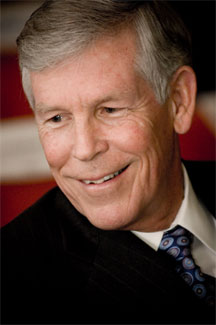 I love this story, partly because, as a preacher, I can understand how bugged Lloyd must have been when the men approached him on that Sunday morning. If I needed a cup of coffee before hunkering down to work on my sermon, the last thing I'd appreciate is being distracted by some threatening men and giving away all of my money so I couldn't buy a cup of coffee. I can also relate to the wonder of being used by God to make a difference in somebody's life, even when I wasn't all that happy about how it happened. I love this story, partly because, as a preacher, I can understand how bugged Lloyd must have been when the men approached him on that Sunday morning. If I needed a cup of coffee before hunkering down to work on my sermon, the last thing I'd appreciate is being distracted by some threatening men and giving away all of my money so I couldn't buy a cup of coffee. I can also relate to the wonder of being used by God to make a difference in somebody's life, even when I wasn't all that happy about how it happened.
After Lloyd finished telling the story, he invited his friend Connie Mack, the former senator from Florida, to share a couple of recent examples of how God had used him to minister to hurting people. In both cases, a very busy Senator Mack allowed his plans to be derailed by the needs of people. His willingness to be available, both to people and to the Lord, made a real difference. He summed up both stories by saying, "There are no coincidences." (Photo: Senator Connie Mack. Yes, he is related to the baseball star. He's his grandson.)
Lloyd Ogilvie and Connie Mack are influential and highly successful people in the eyes of the world. Yet their stories of being used by God don't depend for their success or their importance. They simply let God work in their lives, and He did the rest, marvelously so.
Perhaps God wants to use me today in ways I'm not expecting. Perhaps He wants to use you.
Do You Need to Be Disillusioned?
Part 3 of series: Sharing Laity Lodge
Permalink for this post / Permalink for this series
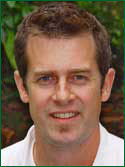 At a recent retreat at Laity Lodge, I participated in an early morning devotional led by Steven Purcell, my colleague who is the Director of Laity Lodge. He began by saying that he went through a period of time in his life when he experienced a lot of disillusionment. Then he added, almost as an afterthought, "Of course it isn't necessarily bad to be disillusioned. After all, doesn't the word mean 'getting free from illusions'? Perhaps dis-illusionment is a necessary part of growing in the truth." (Photo: Steven Purcell) At a recent retreat at Laity Lodge, I participated in an early morning devotional led by Steven Purcell, my colleague who is the Director of Laity Lodge. He began by saying that he went through a period of time in his life when he experienced a lot of disillusionment. Then he added, almost as an afterthought, "Of course it isn't necessarily bad to be disillusioned. After all, doesn't the word mean 'getting free from illusions'? Perhaps dis-illusionment is a necessary part of growing in the truth." (Photo: Steven Purcell)
I'd never thought of that before, though I've probably used the word "disillusioned" or one of its cousins a hundred times. (A Google search of my website turns up two uses of "disillusioned.") If I am fooled by an illusion, if I embrace as true something that isn't, then disillusionment might be painful, but it is a necessary step on the road to truth and health.
I wonder what illusions I need to be set free from? Where do I need disillusionment? When it comes, will I accept it as a tough but gracious teacher, or will I cling to my illusions?
 Do we need to be disillusioned when it comes to God? Many in our time of history do, because it's ever so popular for people to form their own theologies on the basis of their wishful thinking about God, not on the solid foundation of God's own self-revelation in history. But even those of us who know God through Jesus Christ, and who derive our core theology from Scripture, do often believe things that aren't true about God. For us, God may be a big ol' friend who is there to give us everything we want . . . hardly the biblical God. Or perhaps our "God" is harsh and severe, rather than gracious and merciful. To some extent, we all need to be disillusioned when it comes to God, so that we might embrace the truth of God's nature as revealed to us thorugh Christ and through Scripture. (Photo: a scene from Laity Lodge a few days ago. This brilliant tree was no illusion.) Do we need to be disillusioned when it comes to God? Many in our time of history do, because it's ever so popular for people to form their own theologies on the basis of their wishful thinking about God, not on the solid foundation of God's own self-revelation in history. But even those of us who know God through Jesus Christ, and who derive our core theology from Scripture, do often believe things that aren't true about God. For us, God may be a big ol' friend who is there to give us everything we want . . . hardly the biblical God. Or perhaps our "God" is harsh and severe, rather than gracious and merciful. To some extent, we all need to be disillusioned when it comes to God, so that we might embrace the truth of God's nature as revealed to us thorugh Christ and through Scripture. (Photo: a scene from Laity Lodge a few days ago. This brilliant tree was no illusion.)
In your next time of prayer, you might ask the Lord where, if at all, you're in need of theological disillusionment. But don't stop there. Ask that God reveal Himself to You in the fullness of truth. Give up the illusion, the partial truth, the confusion, and know God in the truth of His revelation.
At Bit of Autumn at Laity Lodge
Part 4 of series: Sharing Laity Lodge
Permalink for this post / Permalink for this series
One of the paths to the center of Laity Lodge, with the cliffs of the Frio River in the background . . .

Greg Ogden at Laity Lodge
Part 5 of series: Sharing Laity Lodge
Permalink for this post / Permalink for this series
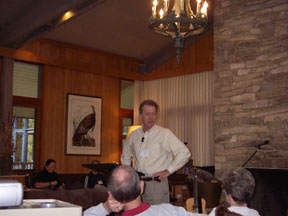 This past weekend Greg Ogden spoke at Laity Lodge, at a retreat for Westlake Hills Presbyterian Church of Austin, Texas. Greg is currently the Executive Pastor of Discipleship at Christ Church of Oak Brook, Illinois. Before going to Christ Church, Greg served as a pastor in several churches, mostly in California. He was also the Director of the Doctor of Ministry Program at Fuller Theological Seminary. Greg has written several books, including Unfinished Business: Returning the Ministry to the People of God (Zondervan, 2003), Discipleship Essentials: A Guide to Build Your Life in Christ (InterVarsity Press, 1998). Next month his new book, co-written with Dan Meyer, will be released: Leadership Essentials: Shaping Vision, Multiplying Influence, Defining Character (InterVarsity Press, 2007). (Photo: Greg Ogden speaking at Laity Lodge) This past weekend Greg Ogden spoke at Laity Lodge, at a retreat for Westlake Hills Presbyterian Church of Austin, Texas. Greg is currently the Executive Pastor of Discipleship at Christ Church of Oak Brook, Illinois. Before going to Christ Church, Greg served as a pastor in several churches, mostly in California. He was also the Director of the Doctor of Ministry Program at Fuller Theological Seminary. Greg has written several books, including Unfinished Business: Returning the Ministry to the People of God (Zondervan, 2003), Discipleship Essentials: A Guide to Build Your Life in Christ (InterVarsity Press, 1998). Next month his new book, co-written with Dan Meyer, will be released: Leadership Essentials: Shaping Vision, Multiplying Influence, Defining Character (InterVarsity Press, 2007). (Photo: Greg Ogden speaking at Laity Lodge)
I had not met Greg before this weekend, which is a bit strange, as I'll explain below. I was familiar with him mostly because he and I share many friends in common, and because of his writings. Greg's books, especially Unfinished Business (which was published in an earlier version in 1990 as The New Reformation) and Discipleship Essentials have become popular classics because of their clarity and biblical faithfulness.
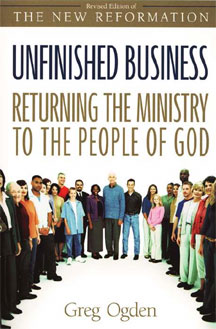 Greg's speaking is much like his writing: engaging, lucid, based on Scripture, and relevant to the challenges facing every Christian today. During the retreat he focused on "Returning the Ministry to the People of God," using material from Unfinished Business. His first message had the intriguing title, "Jesus is Not Enough." Don't worry about Greg's orthodoxy. He believes that salvation comes only through Christ. But what Greg pointed out was that the Christian life is more than simply a personal, individualistic relationship with Jesus. It necessarily includes relationship with our fellowship disciples as we serve Jesus in the world. Greg's speaking is much like his writing: engaging, lucid, based on Scripture, and relevant to the challenges facing every Christian today. During the retreat he focused on "Returning the Ministry to the People of God," using material from Unfinished Business. His first message had the intriguing title, "Jesus is Not Enough." Don't worry about Greg's orthodoxy. He believes that salvation comes only through Christ. But what Greg pointed out was that the Christian life is more than simply a personal, individualistic relationship with Jesus. It necessarily includes relationship with our fellowship disciples as we serve Jesus in the world.
In his second message Greg explored the tricky issue of how to help churches move from a sub-biblical model in which pastors do all the ministry to a biblical one in which all members are also ministers. He asked many challenging questions, including one that really got me thinking:
How do we help people have expectations that ministry received from fellow gifted members is equal to ministry received from the pastor?
In my experience as a pastor, this question is not easy to answer in principle, but not in fact. If people grow up in the church with an understanding that the pastor is the professional caregiver, and if they tend to view pastors as somehow more spiritual than other members, then they are reticent to give up their expectations for pastors. If a church member is in the hospital and gets ten wonderful visits from other members trained by the pastor, but not one from the pastor himself or herself, chances are that this person will be unhappy with the pastor. It's very, very hard to help people's expectations for ministry change once they have experienced a traditional, pastor-centered model of church.
 Greg is asking the right questions and addressing the right issues, in my opinion. If you're not already familiar with his writings, let me recommend them to you. They are readable, well-informed, and solidly-based on Scripture. Unfinished Business is one of the finest recent books on the ministry of all of God's people. It's a great resource for church leaders and adult educational classes. (Photo: A scene from Laity Lodge in the late autumn.) Greg is asking the right questions and addressing the right issues, in my opinion. If you're not already familiar with his writings, let me recommend them to you. They are readable, well-informed, and solidly-based on Scripture. Unfinished Business is one of the finest recent books on the ministry of all of God's people. It's a great resource for church leaders and adult educational classes. (Photo: A scene from Laity Lodge in the late autumn.)
On a personal note, I mentioned above that I had not met Greg before this weekend, though I had known of him for years. He works with Dan Meyer, the Senior Pastor of Christ Church of Oakbrook, who is an old friend. Moreover, as it turns out, our lives are even more intertwined than I had expected. Greg and I are both graduates of Glendale High School, though I came along a few years after he did. His wife's brother, Sam, was a classmate of mine at GHS and a good friend. Moreover, his wife, Lily, was the principal of the school in which my brother-in-law was a teacher. He said she was his favorite principal of all time. Sometimes the world seems very small.
Mark Toone and Grappling with God
Part 6 of series: Sharing Laity Lodge
Permalink for this post / Permalink for this series
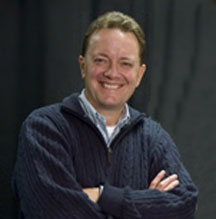 A few weeks ago Mark Toone spoke at Laity Lodge for a men's retreat from Covenant Presbyterian Church in Austin, Texas. Mark is the Senior Pastor of Chapel Hill Presbyterian Church in Gig Harbor, Washington. His creative and challenges message at Laity Lodge filled out the theme "Character Sketches," and focused on several biblical figures, including Jacob and Joseph. A few weeks ago Mark Toone spoke at Laity Lodge for a men's retreat from Covenant Presbyterian Church in Austin, Texas. Mark is the Senior Pastor of Chapel Hill Presbyterian Church in Gig Harbor, Washington. His creative and challenges message at Laity Lodge filled out the theme "Character Sketches," and focused on several biblical figures, including Jacob and Joseph.
Mark's message on Jacob considered the incident in Genesis 32 when Jacob wrestled with the Lord. Here's the text:
24 Jacob was left alone; and a man wrestled with him until daybreak. 25 When the man saw that he did not prevail against Jacob, he struck him on the hip socket; and Jacob’s hip was put out of joint as he wrestled with him. 26 Then he said, “Let me go, for the day is breaking.” But Jacob said, “I will not let you go, unless you bless me.” 27 So he said to him, “What is your name?” And he said, “Jacob.” 28 Then the man said, “You shall no longer be called Jacob, but Israel, for you have striven with God and with humans, and have prevailed.” 29 Then Jacob asked him, “Please tell me your name.” But he said, “Why is it that you ask my name?” And there he blessed him. 30 So Jacob called the place Peniel, saying, “For I have seen God face to face, and yet my life is preserved.”
Mark stated that we all have times of wrestling with God, times when we fight against God's will for us or when we hang onto God for dear life. "God wants to use these wrestling times," Mark explained, "to stretch us and shape us." In this process we become the people God wants us to be.
As an illustration of the centrality of wrestling with God in the Christian life, Mark citied the mission statement of his church. It begins:
Our mission as a church is to present everyone mature in Chirst.
To accomplish our mission, we have identified five areas in which to provide opportunities for our church family to mature in their walk with Christ and to which we pledge our commitment as a body. We call these the five Gs:
• Gather
• Glorify
• Grapple
• Give
• Go
Now I've seen plenty of church mission statements in my life. Four of these five Gs are fairly predictable (which is not a criticism, by the way. One would hope that glorifying God is central to the mission of every church). But I have never seen a church give so much centrality to "Grapple." The expansion of "Grapple" on the Chapel Hill website reads:
A sincere and prayerful commitment to the Lordship of Christ over my entire life. "I promise courageously to learn to follow Jesus as Lord of every area of my life." Luke 6:46; Luke 9:23-25.
The main point of "Grapple" is commitment to Christ as Lord. But I'm impressed by the realism of the grappling image. We who seek to live under the Lordship of Christ often find that, like Jacob, we have to wrestle with Him before we are prepared to submit to Him. The amazing part of this engagement is that God allows us to grapple with Him without wiping us out. He not only brings us into conformity with His will through this gracious process, but He also shapes us to be more like Him.
It should come as no surprise that I would be favorably impressed by the prominence of grappling in the mission statement of Chapel Hill Presbyterian Church. My book on prayer is called No Holds Barred: Wrestling with God in Prayer. The Psalms, it seems to me, illustrate wonderfully the freedom we have to wrestle with God. Grappling isn't just for Mark Toone and the members of Chapel Hill Presbyterian Church. It's for all of us who seek to follow Jesus and who have given our lives to Him.
A Musician After God's Own Heart
Part 7 of series: Sharing Laity Lodge
Permalink for this post / Permalink for this series
A few weeks ago I got to know Brian Moss, "a musician after God's own heart." As you may know, this description was first used of David in the Old Testament. When Saul dishonored the Lord, Samuel said to him, "[N]ow your kingdom will not continue; the LORD has sought out a man after his own heart; and the LORD has appointed him to be ruler over his people, because you have not kept what the LORD commanded you" (1 Samuel 13:14). This man "after God's heart" was David, who would one day be king of Israel.
David is well known to us, not only as a central figure in Old Testament history, but also through his poetry. He is the author of many of the biblical Psalms, and the inspiration for many others. In the Psalms we see the heart of David, the heart that yearned for God.
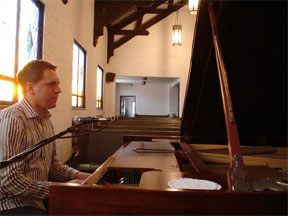 Why do I call Brian Moss "a musician after God's own heart"? Well, on the most obvious level, like David, he sings praises to God as a talented singer and pianist. And, like David, Brian doesn't simply perform, but he draws people into worship. He is an astute and sensitive worship leader, who seeks to draw people's attention, not to himself, but to the Lord. (Photo: Brian at the piano) Why do I call Brian Moss "a musician after God's own heart"? Well, on the most obvious level, like David, he sings praises to God as a talented singer and pianist. And, like David, Brian doesn't simply perform, but he draws people into worship. He is an astute and sensitive worship leader, who seeks to draw people's attention, not to himself, but to the Lord. (Photo: Brian at the piano)
Brian Moss is like David in that he is also a gifted poet and writer of worship music. One of the things he has done so well is to take old hymns and set them to new music, thus bringing to life some texts that are lyrically rich and well worth singing today. Check our, for example, his album, Not What My Hands Have Done. You can hear an excerpt from this album at Brian's myspace. You can order it from iTunes also.
 But Brian has engaged upon a classic songwriting project that shows even more plainly his similarity to David. His recent album, Prayerbook No. 1, is the beginning of a 10-volume treatment of the Psalms. That's right, all 150 of them. You can learn more about this project from Brian's blog: prayerbookproject. But Brian has engaged upon a classic songwriting project that shows even more plainly his similarity to David. His recent album, Prayerbook No. 1, is the beginning of a 10-volume treatment of the Psalms. That's right, all 150 of them. You can learn more about this project from Brian's blog: prayerbookproject.
Like some of the great hymn writers of history, Isaac Watts, for example, Brian takes a psalm and uses it as the basis for a song. The song draws from the words of the psalm without simply putting the psalm itself to music. Here, for example, is Psalm 1 and Brian's song, called, "Joy Will Come to You."
Psalm 1
1 Happy are those
who do not follow the advice of the wicked,
or take the path that sinners tread,
or sit in the seat of scoffers;
2 but their delight is in the law of the LORD,
and on his law they meditate day and night.
3 They are like trees
planted by streams of water,
which yield their fruit in its season,
and their leaves do not wither.
In all that they do, they prosper.
4 The wicked are not so,
but are like chaff that the wind drives away.
5 Therefore the wicked will not stand in the judgment,
nor sinners in the congregation of the righteous;
6 for the LORD watches over the way of the righteous,
but the way of the wicked will perish.
"Joy Will Come to You"
Joy will come to you
In the word, the way
Hold it in the night
And live it in the day
Like a tree beside
The running, living blue
Water into life
This joy will come to you
Walk away from sin
Hate has many eyes
Mocking what is good
Their house is built on lies
Joy will come to you
In the word the way
Hold it in the night
And live it in the day
Like a tree beside
The running, living blue
Water into life
This joy will come to you
Joy will come to you
Copyright 2005, Parson John Publishing (ASCAP), by Brian Moss
You can hear Brian sing "Joy Will Come to You" from his myspace.
I had the chance to get to know Brian and his wife Stephanie while they were out at Laity Lodge. They are both kind, humble, and amazingly talented people. Stephanie is a ballet dancer in addition to being a mother of four!
I commend Brian's music to you. How exciting it is to see new artists drawing inspiration from the Psalms so that we might also be people after God's own heart.
Speaking of Musicians After God's Own Heart . . . Let Me Introduce Jeff Johnson, Brian Dunning, and Gwen Franz
Part 8 of series: Sharing Laity Lodge
Permalink for this post / Permalink for this series
In my last post I wrote about meeting Brian Moss, a musician "after God's own heart." Earlier this week at Laity Lodge I added three more musicians to my list of talented artists who seek God's glory in all they do. (Ironically, they happen to be friends of Brian Moss.)
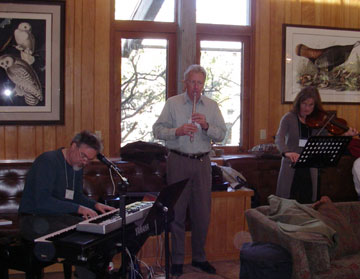 At a pastors' and leaders' retreat that happened a few days ago, we were led in musical worship by Jeff Johnson, Brian Dunning, and Gwen Franz. Jeff played keyboard and sang. Brian played flute and other similar instruments. Gwen played the viola. Sometimes they played as we listened. Sometimes they played as we sang along. One night they led us in what they call a Selah service, a worship time of performed and sung music, along with silence and prayer. At a pastors' and leaders' retreat that happened a few days ago, we were led in musical worship by Jeff Johnson, Brian Dunning, and Gwen Franz. Jeff played keyboard and sang. Brian played flute and other similar instruments. Gwen played the viola. Sometimes they played as we listened. Sometimes they played as we sang along. One night they led us in what they call a Selah service, a worship time of performed and sung music, along with silence and prayer.
This trio played several familiar hymns as well as newer songs, many written by Jeff Johnson (sometimes in collaboration with Brian Moss). With strong Celtic influences, their music was as entrancing as it was pleasant to the ears. They had a marvelous way of enhancing the meaning of Christian music through their instruments. And, unlike some performers who can't get out of the spotlight enough to lead worship effectively, this trio exemplified the humility that's essential to strong worship leadership.
You may very well have heard some of the music of Jeff Johnson and Brian Dunning. Many of their songs have been included in Windham Hill recordings, as well movie soundtracks (such as Gangs of New York). One of their albums, A Quiet Knowing – Canticles for the Heart, is one of my all-time favorites for times of prayer. I have probably used this album well over a hundred times during my personal devotions. (For an example of the instrumental music on A Quiet Knowing, check out this clip of "Amazing Grace." For more information on this album or to order it, look here. You can also find their music at iTunes. For more information and a way to sample and/or purchase the music of Jeff, Brian, and their colleagues, check out the ArkMusic website.
The Selah Service is one of Jeff Johnson's latest passions. It is a worship experienced that uses music, Scripture, prayer, and silence to facilitate devotion to God. It is similar to a Taizé service in its simplicity and open-heartedness. If you're looking for new ways to grow in your personal worship, or to help you church to grow, check out Jeff's Selah Service website. There you'll find more explanation, examples, and resources.
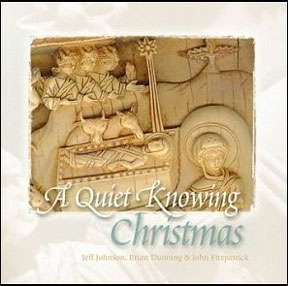 I was very pleased to learn that Jeff and his colleagues have produced several Christmas albums. I purchased two of these and am listening to them with great delight. Both feature instrumental arrangements of Christmas and Advent music, some quite familiar, some more unusual. (If you're familiar with the Windham Hill Winter Solstice and Christmas albums, you'll recognize several of these arrangements.) Click here to listen to a part of "O Come, O Come, Emmanuel" from A Quiet Knowing Christmas; and here from a bit of "Sing We Now of Christmas" from Stars in the Morning East – A Christmas Meditation. (Photo: A Quiet Knowing Christmas) I was very pleased to learn that Jeff and his colleagues have produced several Christmas albums. I purchased two of these and am listening to them with great delight. Both feature instrumental arrangements of Christmas and Advent music, some quite familiar, some more unusual. (If you're familiar with the Windham Hill Winter Solstice and Christmas albums, you'll recognize several of these arrangements.) Click here to listen to a part of "O Come, O Come, Emmanuel" from A Quiet Knowing Christmas; and here from a bit of "Sing We Now of Christmas" from Stars in the Morning East – A Christmas Meditation. (Photo: A Quiet Knowing Christmas)
I love the music of Christmas. But early in the Christmas season, which is actually the season of Advent if you follow the Christian year, I'm not ready for "Hark the Herald Angels Sing" blasted by a 50-voice choir. And I'm really not ready for endless versions of "The Little Drummer Boy" in shopping mall Muzak. I want music that invites me slowly, quietly into the Christmas spirit, music that heightens my hope and expectation, which is what Advent is really all about. The Christmas albums produced by Jeff Johnson and his friends are perfect for this purpose. I highly recommend them. In fact, if I were you, I'd go straight to the Ark Music website and examine what's available. You can also purchase these albums from Amazon, if you prefer: Stars in the Morning East; A Quiet Knowing Christmas. (You get a better deal from Ark Music, but you need to use PayPal.)
Introducing N.T. Wright at Laity Lodge
Part 9 of series: Sharing Laity Lodge
Permalink for this post / Permalink for this series
A few days ago we were blessed to host a retreat for pastors and other leaders with N.T. Wright as speaker. Bishop Tom, as he is usually called in casual settings, spoke several times and participated in one long Q & A session. He and his wife, Maggie, are delightful people, the kind of people who are happy to hang out after lunch for a scintillating conversation around the table.
Many of my blog readers will be familiar with N.T. Wright, or Tom Wright as he is known through his popular writings. But some may not know of him, or may have only a vague notion of who he is. So I thought it might be helpful for me to reproduce in writing my oral introduction of Bishop Tom at Laity Lodge. I did not script and read that introduction, so you're getting more or less what I actually said. At any rate, if you're not familiar with Bishop Tom, this will help you get to know him. So, with no further ado, here's my introduction . . . .
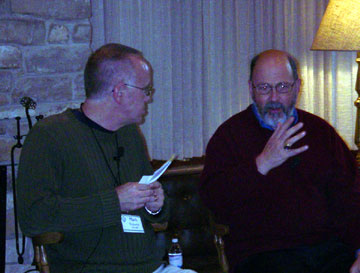 It is my privilege to introduce to you someone who needs no introduction. We've all come to this retreat because of our high regard for our speaker, who is well known through his prolific writings as well as his seasoned leadership of the church throughout the world. I'm here this weekend as the Senior Director of Laity Lodge, of course. But, in fact, I had registered for this retreat months before I came on staff here. The chance to hear Bishop Tom speak was well worth the trip from Southern California, where I lived until a couple of months ago. (Photo: from the Q & A at Laity Lodge.) It is my privilege to introduce to you someone who needs no introduction. We've all come to this retreat because of our high regard for our speaker, who is well known through his prolific writings as well as his seasoned leadership of the church throughout the world. I'm here this weekend as the Senior Director of Laity Lodge, of course. But, in fact, I had registered for this retreat months before I came on staff here. The chance to hear Bishop Tom speak was well worth the trip from Southern California, where I lived until a couple of months ago. (Photo: from the Q & A at Laity Lodge.)
My appreciation for Bishop Tom began in 2000, when I took a three-month sabbatical from my pastoral work at Irvine Presbyterian Church. One of my goals for my sabbatical was to read four giant, classic books: Herman Melville's Moby Dick, Victor Hugo's Les Miserables, and N.T. Wright's, The New Testament and the People of God (535 pp) and also Jesus and the Victory of God (741 pp). Bishop Tom's books aren't quite as long as those two great novels, but they do total more than 1200 pages.
Reading all four of those classics during my sabbatical was a wonderful experience. Two of the books were among the greatest novels I had ever read. And the other two, those by Bishop Tom, were among the greatest works of scholarship I had ever read. What made them so exceptional? In a nutshell, they explained Jesus and His ministry in an utterly compelling fashion by examining in detail the cultural, historical, and theological context for Jesus, and then interpreting the text of the Gospels in that context. Along the way, Bishop Tom incisively and graciously decimated the views of many of his academic opponents, especially much of the nonsense that had been popularized by the Jesus Seminar.
This is not to say that the picture of Jesus emerging from Bishop Tom's writings is the individualistic "savior" so common in Western evangelicalism. Though he believes that Jesus saved us from our sins and opened up for us a bright future after death, Bishop Tom helps us to hear the true message of Jesus, the message of the reign of God come to earth, the message of a salvation that is far more extensive than what we often think, the message that calls a community of disciples to join Jesus in His work of "putting the world to rights."
Throughout his prolific writings and by his personal example, Bishop Tom challenges us to get back to Scripture, to read more carefully those documents we include within the written Word of God. Sometimes his own study of these documents, always done with close attention to their original context, takes him in new and even discomforting directions. Yet he remains faithful to the text of Scripture, urging us to do the same even if such faithfulness invades our theological comfort zones.
We have with us for these next two days one of the most influential and respected biblical scholars in the world today. If Bishop Tom were simply an academic who holes up in libraries to produce masterpieces of scholarship, he'd have our deep respect and gratitude. But, amazingly enough, he is far more than this. He is Bishop Tom, as he likes to be called, because he is officially the Bishop of Durham, one of the most influential leadership positions in the Church of England. As a pastor he preaches, leads in worship, presides over the sacraments, counsels people, teaches classes, and serves on more church committees than any person should have to do prior to Purgatory. Moreover, he has been willing to take a leading role in helping the Anglican Communion deal with some of the trickiest and most divisive issues it has ever faced.
Bishop Tom is a prolific author, not only as N.T. Wright the scholar, but also as Tom Wright the plain-speaking pastor. By the way, there's no truth to the rumor that he is able to write so many books because he has some poor soul named Tom Wright chained to a word processor in the dungeon of his castle. N.T. Wright is Tom Wright. The brilliant scholar who stirs up the academy is also the passionate pastor who instructs and inspires ordinary people, most notably through his marvelous series of commentaries for Everyone.
We are thrilled to host Bishop Tom at Laity Lodge, not only because of his excellent scholarship and leadership, but also because we share with him a deep passion for the ministry of the kingdom of God. Just last week several of us were talking with Howard Butt, Jr. about the core vision of Laity Lodge and its network of ministries. Howard, acknowledging the tendency for the word "laity" to be misunderstood, was searching for different language to express the vision Laity Lodge. Finally he said, "Our vision is this: the people of God for the world." "The people of God for the world," that's what Laity Lodge is all about. And, as you may know, that's what Bishop Tom is all about. In fact, he himself has used this very phrase many times to encapsulate our calling as Christians. The church, according to Bishop Tom, is to be "the people of God for the world."
We are here as pastors and other Christian leaders to learn more about how we can lead the church in this central calling. That's why Laity Lodge is here. And that's why Bishop Tom is here. So, Bishop Tom, we welcome you to this place with gratitude and joy. Thank you for joining us at Laity Lodge for these two days. Please come and help us learn how to lead the church to be the people of God for the world.
My Response to N.T. Wright at Laity Lodge
Part 10 of series: Sharing Laity Lodge
Permalink for this post / Permalink for this series
In my last post in this series I reported on the recent visit of N.T. Wright to Laity Lodge and shared my introduction of him to the retreat there. In this post I want to share some of my responses to Bishop Tom, as he likes to be called.
A Sense of the Man
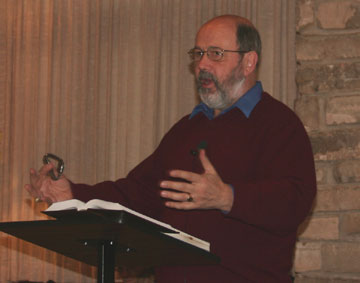 Until I met Bishop Tom a couple of weeks ago, I knew him almost completely through his writings. Over the years I've probably read well over 2,000 pages of his books, which I regard as among the finest works of biblical scholarship I've ever read. As I anticipated meeting him in person, I wondered what he'd be like. Over the years I've met dozens of prominent religious and academic leaders. Many come across as arrogant stuffed shirts, while others seem perfectly normal and rather unimpressed with themselves. (Photo: Bishop Tom at Laity Lodge) Until I met Bishop Tom a couple of weeks ago, I knew him almost completely through his writings. Over the years I've probably read well over 2,000 pages of his books, which I regard as among the finest works of biblical scholarship I've ever read. As I anticipated meeting him in person, I wondered what he'd be like. Over the years I've met dozens of prominent religious and academic leaders. Many come across as arrogant stuffed shirts, while others seem perfectly normal and rather unimpressed with themselves. (Photo: Bishop Tom at Laity Lodge)
I'm happy to report that Bishop Tom fits into the second category. He didn't seem to be looking for homage or praise. In fact, he seemed embarrassed by my rather "over-the-top" introduction. Shortly after we met, I asked him what he preferred to be called. "'Bishop Tom' seems to be most common," he said, "but I'm a fairly informal person, so I don't mind if people forget the 'Bishop' just use 'Tom.'"
Throughout his two days at Laity Lodge, Bishop Tom was at ease in conversations with a wide range of people. In fact, he seemed genuinely interested in the ideas and stories of the retreatants. In the rather long Q&A session during the retreat, he responded to all questions with respect and kindness.
Whatever else one might say about Bishop Tom and his ideas, he clearly seeks to live out his Christian faith in ordinary interactions with ordinary people.
Bishop Tom the Pastor
For the most part, Bishop Tom taught us during his time at Laity Lodge because this is what we asked him to do. He did so with great gusto. In fact, he often moved into a mode I would call preaching. It was clear that the ideas he shared were not just intellectual curiosities, but matters of passion and commitment. He really believes that all of this kingdom of God stuff can really change our lives, our churches, and, ultimately, the world.
Since I think of Bishop Tom mostly as a scholar and a writer, I was moved to hear of his pastoral concern for the people and churches within his diocese, the Diocese of Durham in England. He spoke of how much he desires to bring the hope of the gospel to the parishes over which he is bishop, many of which are struggling financially and spiritually. He also shared about praying for each his couple hundred parishes on a weekly basis. This wasn't a matter of boasting, by the way, but rather an encouragement to us to pray faithfully.
On several occasions, both prior to and after his messages, Bishop Tom led us in prayer. I found his prayers strikingly simple. He didn't even use some of the Anglicanisms that one might expect from a bishop. His language was more common than churchy. Usually he prayed to "Father," much as Jesus taught us. It's quite clear that Bishop Tom, though a high-ranking official in the Anglican Church, and though a top-notch scholar, is a man of genuine, humble faith in God through Jesus Christ. His pastoral care and, indeed, his scholarly writing, is an expression of this fundamental faith.
Of course you don't get to know someone intimately in only two days. But I must say that my two days with Bishop Tom were impressive in ways I didn't expect.
In tomorrow's post I'll explain yet another way Bishop Tom impressed me and, in fact, challenged me.
My Response to N.T. Wright at Laity Lodge (cont)
Part 11 of series: Sharing Laity Lodge
Permalink for this post / Permalink for this series
At the pastors and leaders retreat at Laity Lodge, Bishop N.T. Wright gave five talks. We had asked him to speak from the platform of his fine book Simply Christian, and to spell out implications for Christian leadership. In fact, Bishop Tom did as we had asked, though adding an extra twist. He showed how many of the themes of Simply Christian are lived out in the early church as portrayed in Acts of the Apostles. So we got more than we bargained for, most happily, I might add.
I'm not going to summarize Bishop Tom's teaching. And, unfortunately, Laity Lodge is not yet wired to put things like this online, either for purchase or for podcast. (If you want to purchase the CDs of this retreat, please contact our Administrative Coordinator, Liz Short, for the details.) What I want to do is to share one of my personal responses to Bishop Tom's teaching.
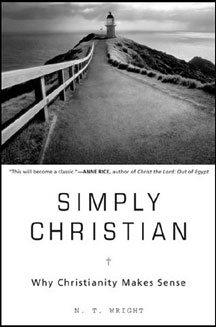 As he connected the points of Simply Christian to the book of Acts, I was struck again and again by Bishop Tom's effort to interpret the text of Scripture accurately. Every time he referred to a passage from Acts, he set that passage in its larger literary and cultural context, and then paid close attention to the actual words and logic of the passage. Now there's nothing radically innovative here. These are exactly the skills I have taught in seminary exegesis courses. But, listening to Bishop Tom, I was reminded of how tempting it is to cut exegetical corners. If I've worked on a text before, or if I think I know what it says, or if I just get tired, I'm inclined not to do the hard work of textual interpretation. Bishop Tom, on the other hand, keeps working away on the text. His example encouraged me and, to be honest, chastened me a bit. As he connected the points of Simply Christian to the book of Acts, I was struck again and again by Bishop Tom's effort to interpret the text of Scripture accurately. Every time he referred to a passage from Acts, he set that passage in its larger literary and cultural context, and then paid close attention to the actual words and logic of the passage. Now there's nothing radically innovative here. These are exactly the skills I have taught in seminary exegesis courses. But, listening to Bishop Tom, I was reminded of how tempting it is to cut exegetical corners. If I've worked on a text before, or if I think I know what it says, or if I just get tired, I'm inclined not to do the hard work of textual interpretation. Bishop Tom, on the other hand, keeps working away on the text. His example encouraged me and, to be honest, chastened me a bit.
I was also impressed by his willingness to admit when he wasn't quite sure what a biblical passage meant. In the Question & Answer session, somebody asked about the meaning of Matthew 25:31-46. That's the passage where the Son of Man/King judges the "sheep" and the "goats." It's the text where Jesus says, "I was hungry and you gave me food, I was thirsty and you gave me something to drink" etc. In response to the question about this passage, Bishop Tom admitted that he still wasn't sure exactly how to interpret it, that he had various theories, but that he hadn't settled on one. Apart from demonstrating impressive humility in this admission, it struck me as coming from someone who just won't "cheat" when it comes to biblical interpretation. He will work on the text for as long as it takes to discern its meaning.
Now that's not to suggest that Bishop Tom is inerrant in his exegesis. I'm sure he gets some things wrong, perhaps even some major things. Which of us doesn't? But his relentless pursuit of biblical meaning is laudable as well as a great encouragement to the rest of us. He reminds me that faithfulness in understanding the Scripture requires hard work. I hope and pray I can imitate Bishop Tom's example in my own life and ministry.
If you're a lay person, if you've never studied Greek or Hebrew, if you don't have lots of hours for study, you may wonder if you can engage in the sort biblical interpretation modeled by Bishop Tom. Though academic training and the knowledge of ancient languages certainly helps, I think it's quite possible for somebody without such advantages to wrestle honestly and successfully with the meaning of Scripture. With a couple of good translations and a couple of decent commentaries, you can come close to the meaning of the original text. Moreover, much of what leads to the successful interpretation of a text has to do with careful reading of the passage and the context again and again and again. This can be done in English translation. So, though I would encourage anyone who is serious about Bible study to get some relevant academic training, I would also say that the discipline and commitment modeled by Bishop Tom are things that any Christian can and should emulate.
His commitment to figuring out what Scripture really says, rather than what we think it says or what we'd like it to say, gets Bishop Tom into trouble at times. He continues to take lots of flak from liberal Christians who are distressed by his interpretation of biblical texts related to homosexuality. Moreover, at the moment, he's on the hot seat with many Reformed and evangelical thinkers – my theological family – for his take on Paul and especially on the meaning of justification. In my next post I'll say a bit more about this controversy.
N.T. Wright and the "New Perspective on Paul"
Part 12 of series: Sharing Laity Lodge
Permalink for this post / Permalink for this series
N.T. Wright is part of a movement among scholars that is sometimes called the "New Perspective on Paul." In this movement you'll find a wide range of opinion on many things as well as plenty of internal disagreement. But all the scholars connected with this New Perspective see Paul differently than he has been interpreted by Lutheran and Reformed theologians for the past few centuries. And this, as you might imagine, has stirred up the pot.
The New Perspective comes, on the one hand, from an effort to understand more accurately the Judaism of Paul's own day, as well as the passages in Paul's letters where he sounds quite positive about the Jewish Law (Philippians 3:5-6, for example, where Paul says he was "as to righteousness under the law, blameless.") On the other hand, advocates of the New Perspective attempt to read Paul in light of his own issues and concerns, rather than in light of historic Protestant issues and concerns. They see Paul as much more interested in the problem of the Jewish and Gentile relationship in the covenant than Martin Luther's struggle with his own guilt. In the New Perspective, certain key tenets of Protestantism, such as "justification" become revised. "Justification by faith" continues to be a key Pauline and theological concept, but it doesn't bear the weight that it has within classic Protestant and Reformed theology.
Some of the Reformed and evangelical critics of N.T. Wright have blasted him with language usually reserved for the worst of heretics. They see him as undermining, not only Protestantism, but also the core of Christian orthodoxy. In an astounding move, one denomination has threatened its pastors with explusion if they adopt the New Perspective. Other of Wright's critics are less inflammatory and dogmatic, but they nevertheless express great concern about his New Perspective reading of Paul.
I've been surprised by some of the arguments used against Wright's exegesis of Paul. One of the common lines is that Wright has abandoned the Reformation's view of Paul and justification by faith. Even if this were true, and I think it's a bit of an exaggeration, I find it curious that Wright's effort to go back to the Bible rather than endorse Reformation theology receives such scorn from the very people who base everything on going back to the Bible (or at least they used to). Isn't sola scriptura at the base of the Reformation? Wouldn't it be contrary to the very spirit of the Reformation to demand that theologians echo Reformation doctrine rather than going back to Scripture itself? It's certainly true that Wright may have misinterpreted Paul. But we aren't going to know this by quoting Luther and Calvin, or even by using extra-biblical theological language (like "imputed righteousness"). Rather, the Reformation itself sends us back to the Scripture itself. If N.T. Wright is wrong about Paul, then this needs to be demonstrated by the same kind of exegesis that he has practiced so assiduously.
Another common argument against Wright's view of Paul is that it doesn't support powerful evangelical preaching. Again, I think this argument substantially misreads Wright, but even if it's true, does it miss the main point? Those who worry that Wright's view of Paul might undermine preaching is perilously close to an "end-justifies-the-means" argument, rather than an argument that upholds the truth of Scripture no matter what the implications. Once more, the question that matters above all else is whether Wright's reading of Scripture is true or not. If, in the end, we must change our preaching, so be it. Yet I'm quite confident that the truth will lead to powerful preaching, whether that truth is ultimately consistent with traditional interpretations of Paul or not.
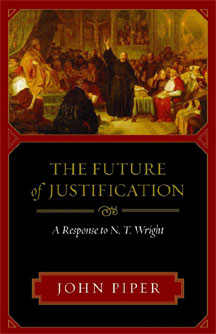 If it sounds like I'm defending Wright's view of Paul, let me say that my personal jury is still out on the matter. Honestly, I haven't been able to take the time to work through all of the issues, and, most importantly, all of the texts. But I will say that I find the arguments used by many of Wright's critics to be way too ad hominem, way too utilitarian, and, ironically, way too Catholic for my taste. I have not yet read one of the latest responses to N.T. Wright, John Piper's The Future of Justification: A Response to N.T. Wright. Knowing Piper's other writings, I expect that this will be a measured criticism of Wright, one that will advance the conversation because it will deal carefully with Scripture. Moreover, Piper did Wright the service of sending an early draft of his book, and Wright did Piper the service of sending back an extensive response. This alone guarantees that Piper's book will be much better than most critiques of Wright, which usually misinterpret him. If it sounds like I'm defending Wright's view of Paul, let me say that my personal jury is still out on the matter. Honestly, I haven't been able to take the time to work through all of the issues, and, most importantly, all of the texts. But I will say that I find the arguments used by many of Wright's critics to be way too ad hominem, way too utilitarian, and, ironically, way too Catholic for my taste. I have not yet read one of the latest responses to N.T. Wright, John Piper's The Future of Justification: A Response to N.T. Wright. Knowing Piper's other writings, I expect that this will be a measured criticism of Wright, one that will advance the conversation because it will deal carefully with Scripture. Moreover, Piper did Wright the service of sending an early draft of his book, and Wright did Piper the service of sending back an extensive response. This alone guarantees that Piper's book will be much better than most critiques of Wright, which usually misinterpret him.
Here is my fear, however. John Piper is very influential, especially among the kinds of people who would be troubled by Wright's take on Paul. I'm afraid that many will buy and read Piper's book before and even without ever reading Wright himself. Then they'll quote or paraphrase Piper, without even going back to read Paul once again to see if Piper is actually right. This, I suggest, is neither Reformed, nor evangelical, nor even especially Christian. One who reads Piper should also read Wright himself, and, more importantly, should dive into a fresh examination of Scripture. Even if Wright is wrong, it's hard to believe that he doesn't have many valuable insights into the text, including many correctives for those of us who have always read Paul in a certain way.
My sincere hope is the Wright will pen a response to Piper (well, keyboard a response, I suppose). Bishop Tom mentioned while at Laity Lodge that he might do this. My greater hope is that the two of them might team up, much in the way Wright and Marcus Borg did on Jesus in their book, The Meaning of Jesus. What could be better than having two articulate teachers and brothers in Christ engage in mutually-respectful dialogue on the meaning of Paul? It's certainly better than some of the flame throwing that Wright has endured from pugilistic Christians.
When I read Piper's critique and any other, and as I continue to wrestle with Wright's own view, my main question will be: Who does the best job interpreting Paul? If it turns out that the Reformation misconstrued some of what Paul actually meant, that's too bad, but so be it. If it turns out that we preachers have to revise what we've preached about justification and righteousness on the basis of what the Bible actually says, so be it. Of all people, we who stand in the line of the Reformation should seek, above all and at any cost, to grasp the true meaning of Scripture and to stake our lives and ministries on it.
Resources
If you're looking for more information on N.T. Wright and the New Perspective on Paul, let me recommend:
Scot McKnight, a series of blog posts on the New Perspective by a top evangelical New Testament scholar.
Collin Hansen, "From the Seminaries to the Pews"; a short history of the recent controversy over the New Perspective
Simon Gathercole, "What Did Paul Really Mean?"; an fine introduction and criticism that appeared in Christianity Today in August 2007
John Piper, The Future of Justification: A Response to N.T. Wright
Transcript of an interview of N.T. Wright conducted by Trevin Wax. An extraordinarily interesting and helpful resource.
N.T. Wright, "New Perspectives on Paul"
N.T. Wright, "The Shape of Justification"
N.T. Wright, "Paul in Different Perspectives"
"A Conversation on Paul with James D.G. Dunn and N.T. Wright"
Gordon Fee on Rejoicing in the Lord
Part 13 of series: Sharing Laity Lodge
Permalink for this post / Permalink for this series
 Recently Gordon Fee came to speak at Laity Lodge. He is now a Professor Emeritus of Regent College in Vancouver, Canada. Before retiring, he taught New Testament courses at Regent, and before that at Gordon-Conwell Theological Seminary. Gordon Fee is a highly regarded New Testament scholar, and an expert in the field of textual criticism. He has written several books, among them How to Read the Bible for All Its Worth (with Doug Stuart). (Photo to right: Dr. Gordon Fee holding forth in the Great Hall of Laity Lodge.) Recently Gordon Fee came to speak at Laity Lodge. He is now a Professor Emeritus of Regent College in Vancouver, Canada. Before retiring, he taught New Testament courses at Regent, and before that at Gordon-Conwell Theological Seminary. Gordon Fee is a highly regarded New Testament scholar, and an expert in the field of textual criticism. He has written several books, among them How to Read the Bible for All Its Worth (with Doug Stuart). (Photo to right: Dr. Gordon Fee holding forth in the Great Hall of Laity Lodge.)
Gordon Fee spoke for a retreat of people from the First Presbyterian Church of San Antonio. He focused on Paul's letter to the Philippians, doing, as one might expect, an excellent job of interpreting the biblical text. (By the way, Gordon has written the best seminary-level guide to the interepretation of the New Testament: New Testament Exegesis.)
I won't summarize Gordon Fee's teaching here. But I do want to mention something he said almost as an aside. He was dealing with Philippians 3:1, which says, "Finally, my brothers and sisters, rejoice in the Lord." Gordon explained that this is not a command to feel happy feelings. Paul is not saying, "Rev yourself up and be joyful." Rather, this is a command to praise the Lord, to worship God. It may well be that when we do this, we will feel joy. But that's not the main point. Paul is repeating in Philippians what can be found throughout the Psalms: calls to praise God through joyful expression.
Gordon Fee has nothing against feeling happy, I'm quite sure. But his take on Philippians is a helpful one. Perhaps you have wondered how you're supposed to make yourself feel joyful when your down in the dumps. It can almost seem as if Paul is telling us to do the impossible. But when we understand that he is calling us to praise God, then we're released from the task of having to make ourselves feel a certain way, a task that often leads to denial and pretending.
Earl Palmer on Regarding Others as Better Than Ourselves
Part 14 of series: Sharing Laity Lodge
Permalink for this post / Permalink for this series
This past weekend we had our annual Leaders’ Retreat at Laity Lodge. Earl Palmer was our main speaker, teaching four Bible studies on Philippians. Our musicians were Kurt Kaiser (composer, pianist) and Michael Davis (violinist and concertmaster for the Louisville Orchestra). Poet and writer, Olga Samples Davis, was our resource leader in the arts.
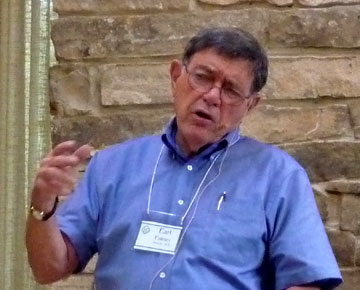 Earl Palmer, by the way, just last week retired as Senior Pastor of University Presbyterian Church in Seattle, after 52 years of ordained ministry. But don’t expect Earl to settle down into easy retirement living. He and some Christian partners have just launched Earl Palmer Ministries, a platform from which Earl will continue to teach Scripture with excellence and contemporary bite. Earl’s first “gig” will be at National Presbyterian Church in Washington D.C., where he will be Preaching Pastor-in-Residence for several months. (Photo: Earl teaching at Laity Lodge.) Earl Palmer, by the way, just last week retired as Senior Pastor of University Presbyterian Church in Seattle, after 52 years of ordained ministry. But don’t expect Earl to settle down into easy retirement living. He and some Christian partners have just launched Earl Palmer Ministries, a platform from which Earl will continue to teach Scripture with excellence and contemporary bite. Earl’s first “gig” will be at National Presbyterian Church in Washington D.C., where he will be Preaching Pastor-in-Residence for several months. (Photo: Earl teaching at Laity Lodge.)
As always, Earl’s teaching of Scripture paid close attention to the original meanings of the words, in this case, the Greek words of Paul’s letter to the Philippian Christians. As he made his way through the text, he came upon an imperative that is often misunderstood: “Do nothing from selfish ambition or conceit, but in humility regard others as better than yourselves” (Phil 2:3, NRSV). “Do nothing from selfish ambition or conceit” isn’t too tricky. But what does it mean to regard others as better than ourselves?
Earl pointed out that sometimes Christians have taken this as reason to think of other people as more valuable than themselves. But this is a mistake, he explained. Paul is not talking about personal worth here. After all, we are all equally valuable in the sight of God. We all bear God’s image and, if we belong to Christ, are God’s own creation.
Earl went on to show that Philippians 2:3 does not mean that we should consider ourselves as less valuable than others. Rather, Paul uses a turn of phrase that means to put others first, to give them the advantage, to regard them highly. Earl’s take on this verse is perfectly captured in Eugene Peterson’s rendering in The Message: “Put yourself aside, and help others get ahead.”
 To underscore this point, Earl supplied an illustration I won’t forget. Suppose, he said, you’re on your way to a picnic and realize that you’ve forgotten the sunscreen. So you stop at a market and hurry to find some SPF-45. Grabbing a tube of sunscreen and hurrying by all of the tempting teasers in the store, you come to the checkout lines with only one item. In front of you is a woman with a cart filled to the brim with groceries. To underscore this point, Earl supplied an illustration I won’t forget. Suppose, he said, you’re on your way to a picnic and realize that you’ve forgotten the sunscreen. So you stop at a market and hurry to find some SPF-45. Grabbing a tube of sunscreen and hurrying by all of the tempting teasers in the store, you come to the checkout lines with only one item. In front of you is a woman with a cart filled to the brim with groceries.
“Don’t ever ask to go ahead of her,” Earl counseled wisely. Instead, stand there, looking slightly rushed and sad. You might even choose to yell, “Honey, I’ll be there in just a minute.” If you’re lucky, the woman in front of you in line will take pity, saying, “Oh, you can go ahead.” And so you do, happily.
This, Earl said, is what it means to regard others as better than ourselves. It’s not a matter of valuing people, but rather of giving them a place ahead of yourself.
This kind of preferring of people does not mean that we think poorly of ourselves. In fact, Earl pointed out that the woman who let you go ahead of her in line will feel good about herself. She did something kind from a place of personal strength and generosity. Similarly, Paul does not want us to go around thinking poorly of ourselves. Rather, when we know who we are in Christ, we’ll have the freedom to “help others get ahead,” and we’ll feel good in doing it.
I won’t soon forget the waiting in line illustration. It does indeed capture Paul’s meaning in Philippians 2. And it reminds us of how we are to live as disciples of Christ, choosing in freedom and joy to imitate his servanthood.
|

